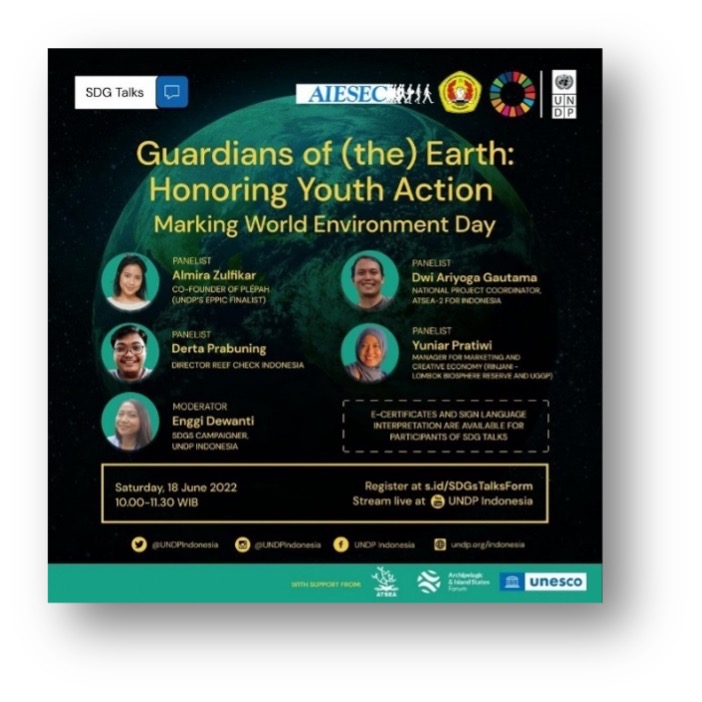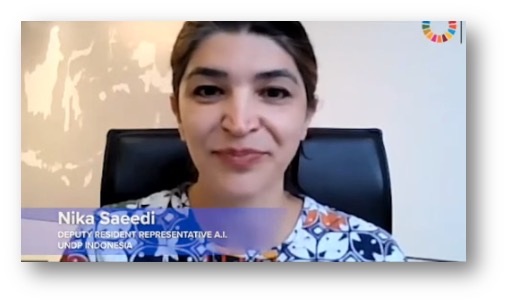Thinking of ways to be guardians of the earth? The easiest way to be done is maybe by rethinking what you have considered as an “eco-friendly” lifestyle
As Indonesia, like the rest of the world, deals with the current pressing environmental challenges, this year’s World Environment Day (WED) provided a sense of urgency to increase collective action among influential youth groups and move the needle in the right direction.
Mobilising youth to address the climate crisis has therefore become of the top agenda at UNDP in marking WED. We recently hosted our monthly SDG talks, entitled ‘Guardians of the Earth: Honouring Youth Action Marking World Environment Day’ in partnership with the SDG Youth Conference of Veteran University (Pembangunan) Yogyakarta. The event focused on the role of eco-friendly businesses and the impact of environmental degradation on local vulnerable communities.
Moderated by UNDP SDG Campaigner Enggi Dewanti, the event featured Dwi Ariyoga Gautama, National Project Coordinator for the Arafura and Timor Seas Ecosystem Action Phase II (ATSEA-2) Project, UNDP’s project in its second phase of implementation, dealing with environmental concerns in the Arafura and Timor Seas (ATS) region; Almira Zulfikar, co-founder of Plépah, an Indonesian start-up offering upcycled and biodegradable products; Yuniar Pratiwi, Manager Marketing and Creative Economy, Rinjani – Lombok Biosphere Reserve UGGp; and Derta Prabuning, Director of Yayasan Reef Check Indonesia.
Mr. Derta set the tone of the discussion: “coral reefs are a vital part of healthy ocean ecosystems,” he said. “Once destroyed, they will influence the rising of sea temperatures and loss of resources,” he added.
The trans-boundary issue was raised during the discussion with Mr. Yoga from the ATSEA-2 Project, who emphasised interdependency.


“Environmental efforts will not be impactful without alignment with the livelihoods of those people directly impacted,” he said, highlighting that inter-governmental cooperation to combat climate crisis will be most effective when supported by people living in coastal communities.
The ATSEA-2 Project is working with countries in the ATS region, including Indonesia, Australia, Papua New-Guinea and Timor-Leste. The project is funded by the Global Environment Facility (GEF).
The combination of economic and environmental approaches is promising. However, the feasibility of zero waste needs to be addressed more seriously, both on land and below water. Marine pollution, for instance, has been contributing to habitat loss and the damage of ecosystems. Oil spills and marine waste, for instance, are greatly influenced by human activities on land.
Ms. Zulfikar from Plépah shared her formula for addressing the waste problem by collaborating with MSME (Micro Small and Medium Enterprises) in food industries to use eco-friendly food packaging, produced by her small and emerging enterprise. Plépah was a finalist in the Ending Plastic Pollution Innovation Challenge (EPPIC) competition, organised in Southeast Asia by UNDP to support social innovators with early seed funding and relevant training to help grow their ideas and solutions for handling plastic pollution.
Mr. Derta from YRCI said that involving local communities in businesses, which form the central part of ecological protection, could also be a viable solution to the problem. “It is our focus for initiatives that offer economic values involving the local communities and preserving the ecosystem,” he said. “We are glad that until now, some local products made by the locals in Rote Ndao, East Nusa Tenggara, are seeing growing demand,” he added.
Those products include soap made from seaweed and coffee made from mangrove fruits. Yoga echoed these remarks, noting that “it is important today that any solutions are easily replicated and consider the end-to-end impact on the environment.”
Waste management is also another issue of pressing concern that calls for action. “Waste is a never-ending problem, especially coming from visitors and hikers,” said Ms. Pratiwi, from Rinjani Geopark. “After several consultations with the village communities around the geopark, we are formulating several changes to rules and regulations to reduce waste in the geopark area,” she added.
Panellists agreed on implementing a bottom-up strategy, to ensure the success of all environmental business initiatives. This will immediately contribute to low-carbon goals, by ensuring that materials are e obtained locally.
Furthermore, any future attempts should focus on scale of replication rather than scale of size; such strategies will ensure that products and services are distributed within an acceptable distance.
This article was originally published on the UNDP Indonesia website.
(By Enggi Dewanti – Campaign Assistant for SDGs, UNDP Indonesia)


